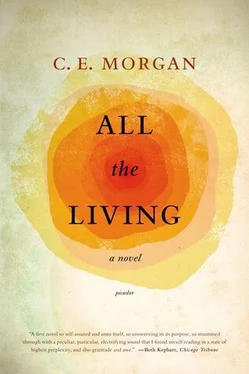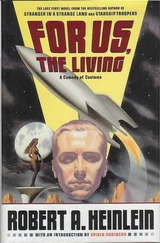She’d seen many churches growing up in the mountains, often perched on hillsides with their graveyards falling slowly down the kudzued hills. Or in the cleavage between hills where they were washed out occasionally with rain, or slurry sometimes. Some of the nicer churches were built out of red brick, but the others were rarely steepled, their weatherboarded sides painted thick gummous white and yards kept up by the congregations so that no one passing by would ever think they didn’t love God enough to manicure his creation. The ones she liked the best — she hadn’t been in one since she was a child — were the holiness chapels, no bigger than a trailer, steepleless and worn, with a hand-painted unschooled sign announcing the preacher. But the church she found in Hansonville, straddling the county line and facing north, was not one of these. It was a larger, but common church — simple, unmonied, white. She parked her truck out front and eyed the batten-sided structure. Only one other car stood parked there, an old one, but shiny still, with long fins that flared high over its brake lights. She eyed it as she walked around it. The front door of the church was locked. She looked at her watch and, seeing that it was only ten, considered going home to come back another time, but it would rankle Orren to waste the gas. She walked around the side of the church, peering in through the eight-paned glass, none of it stained. The sanctuary was clean and tidy in a cheap country way. She tried the back door and it gave under her hand. She found herself in the church’s kitchen, where a man and a much older woman were speaking with each other over a tall butcher block. They both looked up in surprise when she opened the door, flooding the room with light. The woman held a hand up to her wrinkled face and screwed up her eyes. The man said, Can I help you, miss? His eyes were dark and plain and not unpleasant.
Oh, Aloma said, I was looking for the preacher.
That’s me, the man said and his voice was far deeper than she’d expected, it sounded like it came from his belly. He said, I’m Bell Johnson, as if she would take that as proof of something. He watched her expectantly.
Oh, she said. The older woman lowered her hand somewhat and Aloma could see the suspicion bloom in her face.
Well, I was wondering if you need a piano player for your Sunday services?
No, said the woman.
I’m real sorry, said the preacher. Do you go here? I don’t believe I know you.
No, said Aloma, backing out into the blinding light a half step so that she was framed there, made a silhouette.
Are you fixing to go to all the churches in town asking for work? The woman turned to Bell Johnson midway through her sentence as if she were asking him and not Aloma.
It’s alright, Mother, he said, placing his hand on her forearm.
I’m sorry, he said to Aloma, we have a piano player, a good one. I reckon she’s gonna hold up for a while.
I reckon, said his mother and snapped her eyelids like a turtle, only faster.
I play really good, said Aloma, with a little bit of a smile that was directed only at Bell Johnson and not his mother.
I reckon, said his mother again.
Okay, said Aloma. Thank you, and she turned to go, but then the preacher stopped her by saying, Well, if you made all the effort to come out here, I don’t care to take your phone number and name and I’ll give you a holler if we need anything.
Well, alright, said Aloma and she waited while he fingered around in the breast pocket of his button-up shirt for a piece of paper. Do you have a pencil? he asked.
No.
Well, set tight for half a second and I’ll fetch us one. Be back directly, he said and left the room. Aloma looked at the old woman, who seemed for a second about to smile, but it was just a twitch that went nowhere. When the preacher came back in the room, he handed her a pen and she wrote Aloma, piano player, very good . And then her phone number.
Well, thank you, she said, handing him the paper. He folded it carefully and put it back into his pocket. She took a few steps toward the door without turning and she waved her hand, an unnecessary motion wasted on the small space. That made him smile.
Bye now, he said.
See y’all later, said Aloma.
I reckon, said the old woman.
When she pulled back up to the big house, she parked and, looking for Orren, walked on around back without going inside. She sighted him amid the slow-growing but greening tobacco, down on his knees. She walked down the hill, her weight carrying her until she was almost jogging at the bottom. Here at the foot of the small field, she passed a wasting gaze at the plants, which looked even worse up close, not the sea of green they appeared from the kitchen. Beside her, grown tall as her hips, she could see the fragile tips of the leaves, the duskiness of the water-starved plants. She waded into one row so that she had to push them away with both hands.
Watch it, said Orren when he saw her and how she was palming the plants away from her on either side. She could tell by the tone of his voice that he had not yet forgiven her for the other night.
I am, she said. Then: Shouldn’t these be taller?
Yeah, he said and swiped his sweaty face with a sweaty hand, so that he smeared dirt along his cheek in fingerpainted marks. But they got a couple blooms, he said and she saw scattered along the plants the first pursing blossoms, white in their green upstanding sleeves.
When’s the last time it rained? she said, aiming hard for forgiveness.
Not so long, he said. But it’s too hot. I just don’t want these butts to fire up too fast, and he reached out one hand to swat at a few low leaves. Aloma saw the thick sticky hairs on their broadsides, they swayed when he grazed them with his fingertips. They reminded her of a living thing, an animal’s hide.
Are you worried? she said.
No, he lied. But I’d like to hear me some good news.
I have good news, she said, standing beside him now as he kneeled. Well, not good news really.
He looked up at her, he leaned back on his haunches, his hand down at the dirt to balance him. The sun figured behind her and he squinted and could not see her, his eyes teared up from the light so they gleamed an unnatural bright against his dark face.
I went down to that church—
What, Mama’s church?
— and asked if they needed someone to play piano.
That’s good news, he said.
But they didn’t need anybody.
Well, he said, and he wiped his hands now on his bleached and tattered Carhartts. You never know. They might.
At least I tried, she said. I might could make some money yet.
You better make a lot, he said, grimaced, and he stood then, looked at the plant right before him, which was grown past his waist.
I was thinking… Aloma said, still aiming.
He looked at her.
Maybe we could go do something sometime… away from here. She thought of Hansonville and the road that passed the church, the road that went north and kept on going.
Bad time, he said without hesitating.
Bad time… she repeated.
Bad time for a good while, he said again and reached out to the plant before him and topped its baby blossom between his thumb and forefinger.
Hey, she protested.
Got to, he said. You tear off the pretty parts to make it grow stronger. And the blossom fell to the ground where it peeked out lippish from its shell, its smooth young body against the dirt. Orren nudged it under the shade of the plant with the tip of his boot.
Aloma left Orren in the tobacco and returned back up the little hill to the house. She wasn’t foolish enough to expect to hear from the pastor again. She wouldn’t clinch a church job by walking in off the street, she knew that much, but she could think of no other option. Never mind that she’d forgotten to mention her relation to Emma, her only real connection to the church in the first place. But she’d tried and she felt better for the effort, though she’d not put her hands to a real piano. It was nearly good enough to know that she’d been in the same building as one that might have been recently tuned. That alone cheered her enough so that when she walked up from the fields, she forgot to be disappointed in the clean, ruined house and went right to the dining-room table, cleared the far end of Orren’s paperwork, and piled it on a chair. She brought her big box of scores down from upstairs where she’d kept it beside the bed like a hope chest and spread the scores out on the dining table — the Schubert and Beethoven, Ives, Schumann, Grieg. The names buzzed in her mind like a struck string. Flipping them open randomly, pressing them to lie flat so the table was papered in disjointed passages from a dozen pieces. She spread her hands over the pages and turned her face toward the ceiling, her eyes closed. It was an easy thing to do, recall them to mind, shape the structure of their phrasing into her fingers. She opened more scores and piled them on top of the ones already spread so they were inches deep before she stopped, dizzied by the black notes fighting for space. Her fingers shook, her hands were starved for it.
Читать дальше
Конец ознакомительного отрывка
Купить книгу











